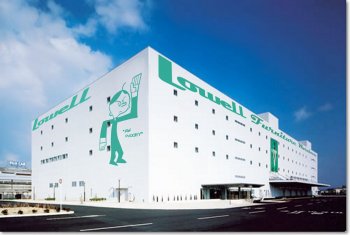 A new recurring series in which we take a look back at the city’s most familiar advertising icons.
A new recurring series in which we take a look back at the city’s most familiar advertising icons.
“Aw … PHOOEY!†The Silent Life of
Sour Grapes Magee
Long-time residents of the city may recall that the dour-faced figure painted on the side of the Lowell Furniture Warehouse – just east of Southwest South Street, by exit 588 – not only once had a name, he had a voice.
For youngsters and newcomers, however, he’s just a puzzle – with a grimace marring his cowlicked head, arm raised in a dismissive wave – the almost entirely silent mascot whose painted profanity of “Aw Phooey†being the only, utterly ambiguous clue behind his connection to a local furniture magnate.
He is Sour Grapes Magee, and there was a time when he was the talk of the town.
David Floyd Lowell, grand old man of the Lowell Furniture empire, opened his first store on the first floor of a modest three-story brick building in the ritzy 117th Avenue district (converted into a portion of the fourteen-story Golda Meir industrial complex in 1978). Welcoming customers through an impressive set of double doors, Lowell had a beautiful picture window by which to display his collection of moderately-priced contemporary American furnishings and a passion for business, but unfortunately he lacked publicity.
 Urged and assisted by his neighbor and good friend, newspaperman Pink Norwood, Lowell himself crafted the figure who would operate as the business’ mascot all the way to Lowell’s death in 1984 – Sour Grapes Magee.
Urged and assisted by his neighbor and good friend, newspaperman Pink Norwood, Lowell himself crafted the figure who would operate as the business’ mascot all the way to Lowell’s death in 1984 – Sour Grapes Magee.
A dour-faced, cow-licked contrarian who resembled the often-criticized idle young middle-class men of the Jazz Age, Magee was immediately pulling long hours as the sole spokesman for Lowell Furniture – in print ads, billboards and radio spots, the reedy, complaining voice of Sour Grapes Magee could be heard or read every hour of the day, by thousands of the city’s then-relatively-few literate citizens.
Unfortunately, the message he delivered confused more than it enticed.
The premise of the ads was fairly straightforward (or so Lowell insisted, up to his death fifty years later); The advertisement would praise Lowell Furniture’s high quality, low prices, excellent location and customer satisfaction. Sour Grapes Magee, however – by dint of his idleness, slow wits or unwarranted pride – would find himself unable to take advantage of Lowell Furniture’s positive features, and would – by way of those eponymous “sour grapes†– put down Lowell Furniture. Often in vehement, illustrative prose.
And therein lay the problem, as potential customers were often confused by the message being delivered. A typical Lowell Furniture print ad might feature a bus full of smiling, happy customers speeding towards Lowell’s, loudly singing the praises of Lowell’s low prices, high quality, and so on. In the corner of the ad, standing beside a broken down car, a frustrated Magee would declare by contrast “Aw, all Lowell Furniture’s gots worms in ‘em!â€
When the ads moved to radio, confusion grew ever more intense. “Awww, Lowell Furniture supports the Kaiser,†declared one infamous ad. “My ma bought a love seat from Lowell’s,†he explains in another, “And now the whole town thinks she’s loose!â€
Well-meaning newspapers, and radio and television stations made it a point to forward letters of complaint and confusion to David Lowell, encouraging him to re-engineer the mascot, fearing they’d lose a consistent advertising dollar if Lowell’s clearly misguided strategy were allowed to continue. But David Lowell stuck to his guns.
The issue at hand, unbeknown to advertisers and customers alike, was that Lowell had a very personal motive in the fabrication of Sour Grapes Magee. According to a biography of David Lowell, written by his daughter Alice in 1990, he fostered a burning hatred for his younger cousin Sylvester Lowell, an unaccomplished author and general layabout, of whom Lowell would often paint vivid, hateful pictures at family events.
While the source of the rivalry between the two cousins yet remains a mystery, it was clearly heated enough that the caricature of Sour Grapes Magee – whose likeness bears an undeniable similarity to Sylvester Lowell’s – persisted as Lowell Furniture’s prominent spokesman right up to Sylvester’s death in 1972.
Citing a clear absence of business growth clearly attributable to Sour Grapes Magee’s confusing public message, Alice Lowell – upon inheriting the business at her father’s retirement – similarly retired Sour Grapes Magee in favor of a more straightforward advertising. The heiress’ strategy has clearly borne fruit, inasmuch as Lowell’s Furniture has not only risen to dominance in the regional furniture wholesaling market, but has opened new warehouse complexes in three surrounding counties.
Nonetheless, both as a tribute to her father’s perseverance and by way of a condition of his will, Sour Grapes Magee holds a place of permanent “honor†on the side of the primary Lowell Furniture Warehouse to this day, raising his hand in silent protest and continuing to baffle an otherwise well-meaning public with his seemingly contrary message.
– J. Morris

